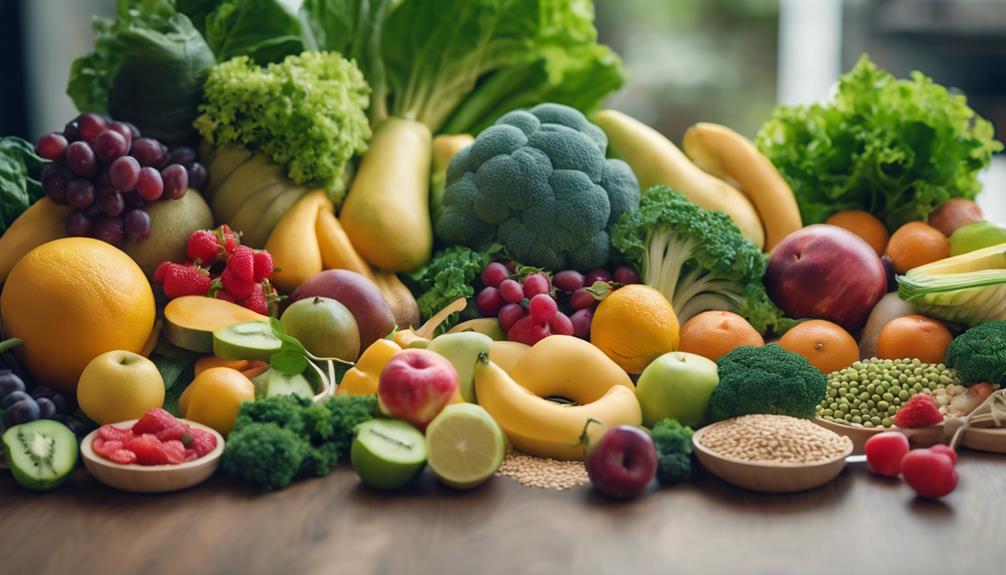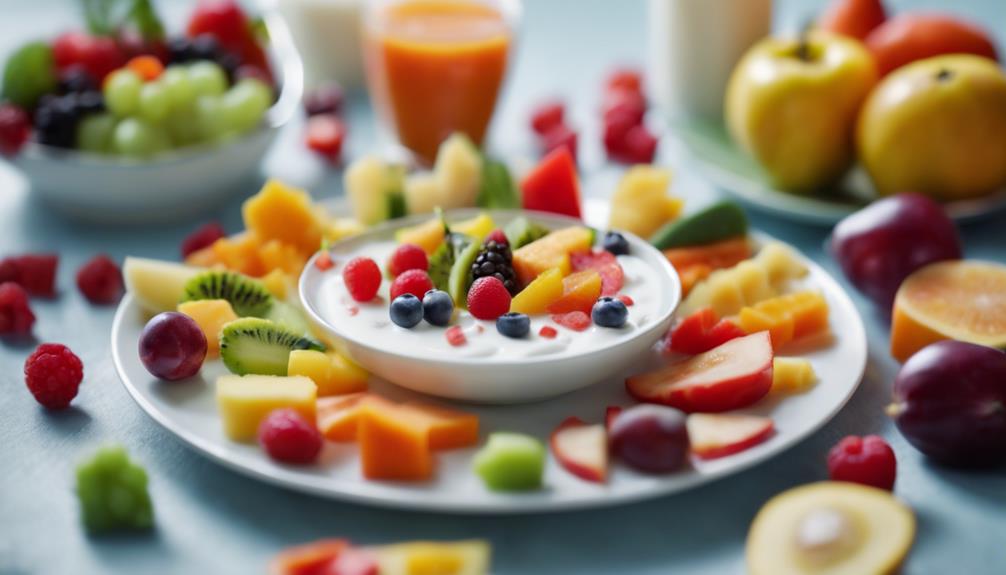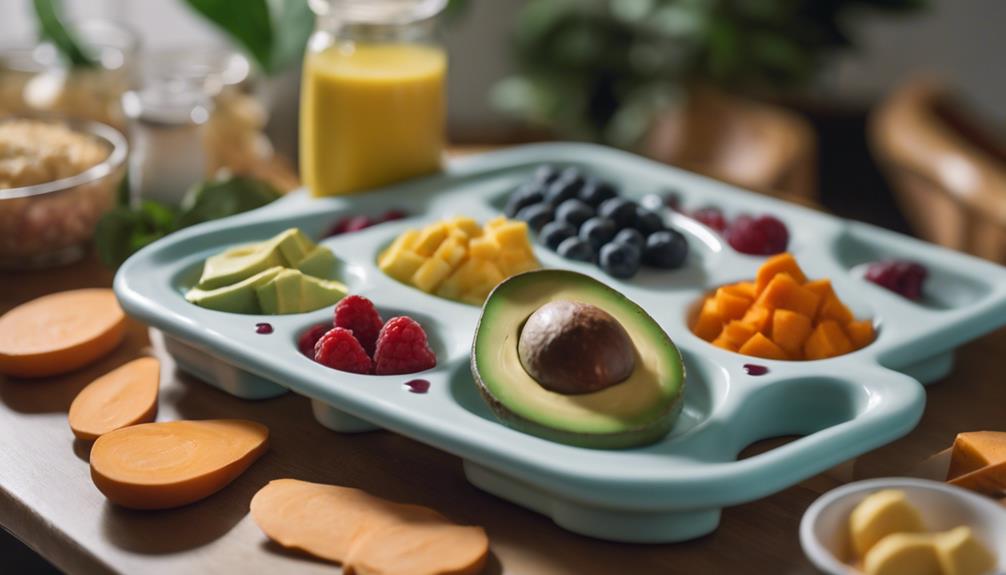For optimal development of your baby’s brain, it is crucial to focus on consuming foods that are packed with essential nutrients. Omega-3 fatty acids, which can be found in fish and seeds, play a key role in supporting cognitive function. Vitamins D and K2 are important for brain and bone growth. Protein from sources like beef and yogurt is vital for the growth of brain cells. Iron, which is found in cereals and lean meats, is essential for brain function. Maintaining a well-balanced diet is crucial to promoting your baby’s cognitive health. Delving deeper into specific food choices can enhance your knowledge on how to nurture your baby’s brain.
Key Takeaways
- Omega-3 fatty acids from fish, flaxseed, and chia seeds support brain development.
- Folate in leafy greens and fruits aids in neural tube formation for the baby's brain.
- Vitamin D and K2 regulate calcium levels crucial for brain and bone development.
- Protein-rich foods like lean beef, yogurt, and beans are essential for brain cell growth.
- Iron-rich foods such as fortified cereals and lean meats optimize brain function.
Essential Nutrients for Baby Brain Development
To guarantee ideal brain development in your baby, concentrate on incorporating essential nutrients like Omega-3 fatty acids, folate, Vitamin D, antioxidants, and protein into their diet. These nutrients play an important role in supporting baby brain function and ensuring healthy growth.
Omega-3 fatty acids, particularly DHA found in fish, flaxseed, and chia seeds, are essential for brain development. Folate, abundant in leafy greens and fruits, aids in neural tube formation, a critical process for the baby's developing brain. Vitamin D supports brain health by regulating calcium levels essential for bone and brain development in infants.
Antioxidants derived from fruits and vegetables protect the baby's brain tissue from damage and promote healthy cognitive function. Additionally, adequate protein intake, obtained from various sources during pregnancy and infancy, is necessary for building cells and hormones crucial for baby brain development.
Importance of Omega-3 Fatty Acids

Integrating omega-3 fatty acids, especially DHA, into your baby's diet is essential for supporting brain development and cognitive function. DHA plays a significant role in the formation of brain cells and neural connections, making up a substantial portion of the brain itself.
By consuming DHA during pregnancy and infancy, you can positively impact your child's brain health, setting a strong foundation for their cognitive abilities.
Fish such as salmon and sardines are excellent sources of DHA, necessary for ideal brain development in babies. These fatty fish provide a concentrated dose of omega-3 fatty acids, aiding in the growth and function of the brain.
If you prefer plant-based options, incorporating foods like flaxseed and chia seeds into your baby's diet can also supply omega-3 fatty acids beneficial for brain growth. Ensuring a diverse range of sources rich in omega-3 fatty acids will support your baby's cognitive function and overall brain health.
Vitamin D and K2 for Brain Growth
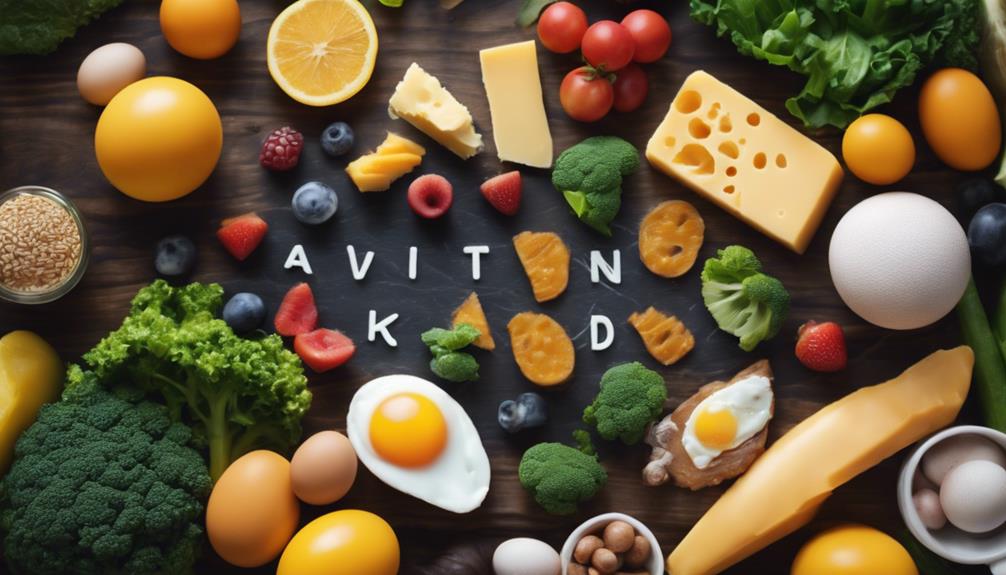
Ensuring your baby receives sufficient levels of vitamin D and K2 is important for promoting healthy brain growth and development. Vitamin D plays a significant role in regulating calcium levels for bone development, while vitamin K2 works synergistically with vitamin D to support proper bone and brain development in infants. Deficiencies in these vitamins can lead to developmental issues in children, making supplementation essential.
Inadequate levels of vitamin D and K2 can result in conditions like rickets, affecting both bone health and overall well-being in babies. By incorporating foods rich in vitamin D and K2 into your baby's diet, you can contribute to optimal brain growth and development.
Protein-Rich Foods for Cognitive Development
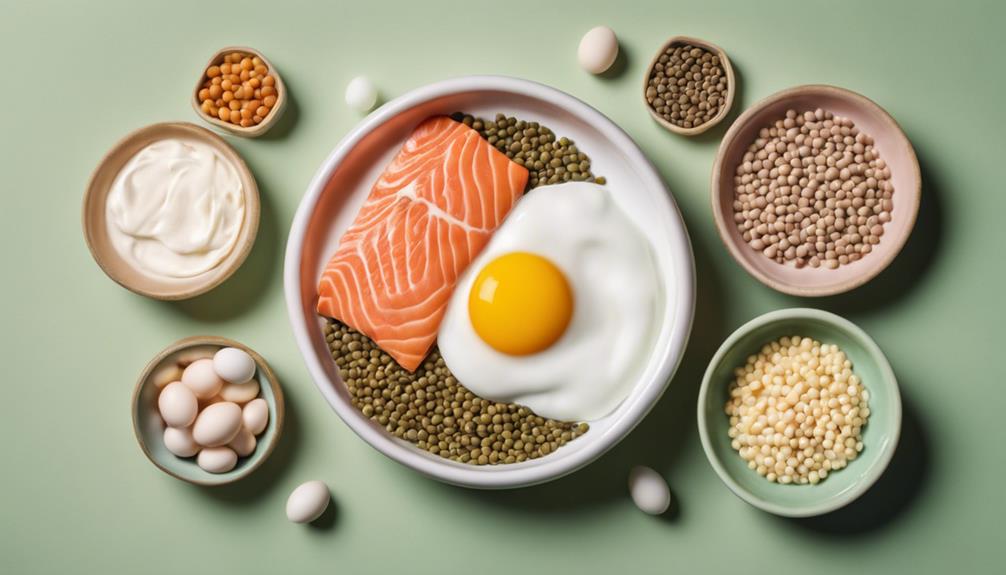
For ideal cognitive development in babies, incorporating protein-rich foods like lean beef, yogurt, and beans is vital. These foods provide the necessary nutrients to support brain cell growth and hormone production essential for cognitive development.
Lean beef is a great source of high-quality protein, while yogurt offers probiotics that aid in digestion and overall health. Beans, on the other hand, are packed with fiber and essential minerals beneficial for brain function.
To boost cognitive development, consider offering your infant snacks like peanut butter on whole-grain crackers. Peanut butter is rich in protein and healthy fats, providing a nutritious option for brain development.
Experts recommend aiming for 75 to 100 grams of protein per day to support excellent brain function in infants. Additionally, yogurt smoothies and bean soup are delicious ways to incorporate protein-rich foods into your baby's diet and promote cognitive growth effectively.
Iron Intake for Optimal Brain Function
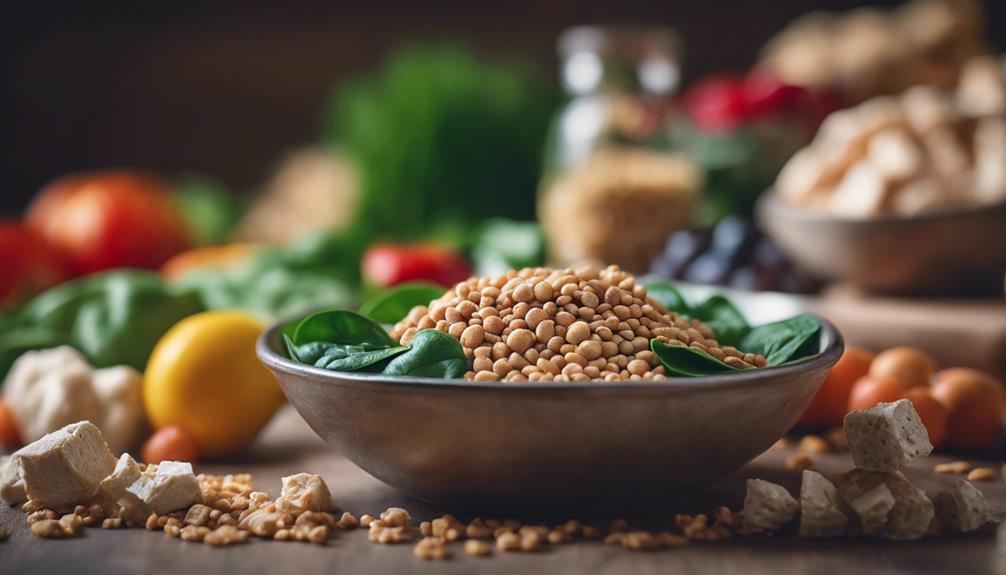
Iron plays a pivotal role in supporting ideal brain function in babies by aiding in the transportation of oxygen to brain cells. Ensuring an adequate intake of iron is essential for cognitive development in infants.
Iron-rich foods such as fortified cereals, lean meats, and beans are necessary for ideal brain health. Babies with iron deficiency may experience cognitive delays and challenges in their learning abilities.
To support your baby's brain development, it's important to consult with your pediatrician about incorporating iron-rich foods into their diet. Your pediatrician can also recommend iron supplements if needed to ensure your baby receives the necessary nutrients for their cognitive growth.
Frequently Asked Questions
Which Food Increases Baby Brain Development?
Want to boost your baby's brain development? Include omega-3 rich foods like fatty fish, antioxidants from fruits and veggies, and protein sources in their diet. Opt for dark leafy greens, blueberries, and tomatoes while avoiding high-mercury fish.
What Are the Top 5 Brain Foods?
For ideal baby brain development, incorporate these top 5 brain foods: avocados for omega-3s, eggs for choline, berries for antioxidants, oats for energy, and Greek yogurt for probiotics. Your baby's brain will thrive!
What Foods Boost Children's Brain?
To boost your child's brain, focus on omega-3s in fish, antioxidants in fruits and veggies, and protein from lean beef and yogurt. Good nutrition during pregnancy and early childhood sets the stage for peak brain development.
How Can I Speed up My Baby's Brain Development?
To speed up your baby's brain development, focus on providing foods rich in omega-3 fatty acids, folic acid, vitamin B12, vitamin C, and zinc. Opt for dark leafy greens, berries, fish, yogurt, beans, and lean meats to support healthy brain growth.
What Do Babies Need the Most for Brain Growth?
To support your baby's brain growth, make sure they receive essential nutrients like omega-3 fatty acids, folic acid, vitamin D, zinc, antioxidants from fruits and veggies, and protein. Ideal brain development in the first 1,000 days is vital.
Conclusion
In summary, it's essential to incorporate foods rich in essential nutrients such as Omega-3 fatty acids, Vitamin D, K2, protein, and iron into your baby's diet to support ideal brain development.
Research shows that children who consume adequate amounts of these nutrients are more likely to have improved cognitive function and learning abilities.
By prioritizing these key nutrients in your baby's diet, you're setting them up for success in the long run.
Invest in your child's future by feeding their brains well.



